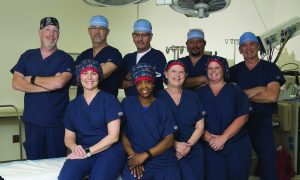The role of the anesthesiologist in heart surgery goes well beyond pain management.

anesthesiologist and perfusionist.
Courtesy of Venice Regional Bayfront Health
When preparing for surgery, many patients think of the anesthesiologist as just the person behind the mask who puts them to sleep and wakes them when it’s over. They may not realize the comprehensive medical care the anesthesiologist provides between those two points and beyond.
“Anesthesiologists play a vital role in a patient’s medical care, making decisions to protect and regulate critical life functions,” said Jonathan Dreier, M.D., a member of the heart team at Venice Regional Bayfront Health. He is board-certified in both anesthesiology and critical care medicine and is part of a private anesthesiology group whose members serve hospitals across Florida.
According to the American Society of Anesthesiologists, anesthesiologists serve as the patient’s advocate and may be the first to diagnose and treat medical problems or complications that may arise before, during and after surgery. They have a wide range of knowledge about medications and how the human body works and responds to the stress of surgery at all stages of a procedure.
Hundreds of thousands of heart and lung surgeries are performed each year in the United States. From open-chest to minimally invasive procedures, all of the surgeries require anesthesia, but heart surgery teams may differ in their approach to the anesthesiologist’s role, Dr. Dreier said.
“In many medical centers, you come to the hospital the morning of surgery and spend five minutes talking with the anesthesiologist,” said Dr. Dreier. “Our process at Venice Regional is different. Patients come in a week prior to surgery so that I can evaluate their complete medical history, discuss the risks and benefits of anesthesia, consider alternatives, and discuss with them their anesthetic plan.”
A major factor is the type of operation that is planned, because some procedures are more complex than others. Additional factors that may affect the anesthetic plan include other medical conditions, chronic opioid use, use of street drugs like marijuana, frequent alcohol use, a patient’s weight, and a patient’s gender.
Spending that extra time to interview the patient a week before surgery provides a double-check for the surgical team, covering history that the patient may have forgotten to tell the surgeon. When Dr. Dreier discovers new information, he discusses it with the surgeon because it may change the surgical plan.
During the pre-operative visit, Dr. Dreier also directs the patient to stop smoking prior to surgery, and may advise that the patient stop taking certain medications or nutritional supplements that could affect the anesthesia.
When the patient comes to the hospital for surgery a week later, Dr. Dreier inserts intravenous lines to monitor the heart and other vital signs, and to deliver anesthetics.
“During the operation, the patient can’t tell us they are in pain, so we assess vital signs that can indicate pain,” he said.
During the surgery, the anesthesiologist co-manages the patient with the surgeon and perfusionist, a healthcare professional who runs the heart-lung bypass machine while the heart and lungs are purposely stopped during surgery.
After surgery, every heart patient at Venice Regional goes to the Cardiovascular Intensive Care Unit (ICU). Typically, heart surgery patients are in the ICU for 24 hours before moving to the medical floor, but they could require intensive care for a longer period.
Dr. Dreier’s rare combination of training allows him to provide continuity of care for heart patients at Venice Regional that is not typical in most hospitals. As the anesthesiologist helping to manage the patient before and during surgery, he has a detailed knowledge of the patient’s condition and everything that happens in the operating room. After surgery, Dr. Dreier applies his training and experience in the ICU as a critical care physician, or intensivist, to co-manage heart patients.
“At Venice Regional, we believe that having the anesthesiologist as a critical care doctor co-managing in the ICU provides superior continuity of care,” Dr. Dreier said. “You need to know what medications were used. Knowing every detail of the surgery helps me manage the patient better in the ICU.”
Research has documented numerous benefits for the patient when ICUs are staffed by an intensivist. Examples include improved patient outcomes, including survival rates; reduced complications; shorter lengths of stay in the ICU; and enhanced medication safety.
For more information about the role of anesthesia in heart surgery, call 941-483-7978
Call 941.483.7978 or visit VeniceRegional.com









